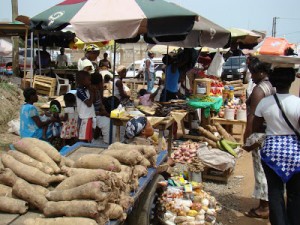Ghana February inflation rate dips from 19% to 18.5%
 The rate of inflation in February decreased slightly from 19 per cent in January to 18.5 per cent.
The rate of inflation in February decreased slightly from 19 per cent in January to 18.5 per cent.
The monthly change rate in February 2016 was 0.7 per cent, while that for January 2016 was 4.6 per cent.
Mr Anthony Amuzu, the Acting Deputy Government Statistician, at a media briefing in Accra, said the year-on-year non-food inflation rate for February 2016 was 24.5 per cent compared with the 25.5 per cent recorded in January 2016.
The inflation rate for imported items was 18.3 per cent in February 2016 compared with 18.7 per cent recorded in January 2016.
He noted that the main price drivers for the non-food inflation rate were Housing, Water, Electricity, Gas and other fuels (41.0 per cent, Transport (30.4 per cent), Education (25.4 per cent) and Recreation and Culture (25.3 per cent).
Mr Amuzu said the price drivers for the food inflation rate were Mineral water, Soft drinks, Fruit and Vegetable Juices (11.7 per cent), Coffee, Tea and Cocoa (11.0 per cent), Sugar, Jam, Honey, Chocolate and other confectionery (10.0 per cent), Vegetables (9.9 per cent, Food products (9.6 per cent) and Oils and Fats (8.5 per cent).
Three regions (Brong Ahafo, Ashanti and Greater Accra) recorded inflation rates higher than the national average of 18.5 per cent.
The Greater Accra Region recorded the highest year-on-year inflation rate of 22.0 per cent, while the Upper East Region recorded the lowest of 13.8 per cent.
Inflation is explained as the rate at which the general level of prices for goods and services is rising and, thus making the purchasing power of a currency to fall. Usually Central Banks attempt to limit inflation, and avoid deflation, in order to keep the economy running smoothly.
Source: GNA
